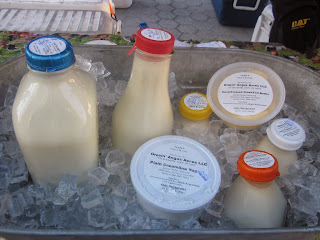 |
| Caradonna's plums and nectarines |
Heirloom tomatoes are disappearing, but you can still find them at Locust Grove, S&SO, Eckerton, Oak Grove, and Cherry Lane. (Cherry Lane also has tasty San Marzano sauce tomatoes.) Oak Grove and Eckerton have all sorts of sweet and hot peppers and Gorzynsky has luscious salad greens, root vegetables, and unsprayed organic apples. Stokes, Sycamore, and Oak Grove have pumpkins and squashes, and Oak Grove has husk tomatoes.
 |
| Quattro's eggs |
Seatuck and PE&DD have delicious shellfish and other fish and Flying Pig and Violet Hill have various pork products and poultry. Quattro's has excellent eggs, capons, chickens, ducks, and other poultry as well as sausages and smoked poultry.
 |
| Stokes squashes |
I was too early to see D'Attolico's offerings, but I'm sure they have tasty sprouts and other produce. Bulich has beautiful mushrooms and Caradonna, Locust Grove, Terhune, Breezy Hill, and others have apples, pears, and other fruit. Locust Grove still has quinces.
 |
| Seatuck fish |
Lani, Windfall, and Mountain Sweet Berry have many kinds of interesting produce, and MSB has started bringing in their unusual potato chips.
 |
| Norwich shelling beans |
To see these and other stands and produce:
Saturday Greenmarket
------------------------------------------------------------------------------------------------
Greenmarket is passing along a message from the National Sustainable Agriculture Coalition and other organizations advocating for small farms throughout the US. It is highly important that farmers and consumers raise their voice on this critical issue:
The Food Safety Modernization Act -
Stand up for Regional Family Farms Today!
The Food Safety Modernization Act (FSMA), the most sweeping reform of the nation's food safety laws in more than 70 years, was signed into law by President Obama on January 4, 2011. The FSMA aims to ensure that the American food supply is safe by shifting the focus of Food and Drug Administration (FDA) regulations from responding to contamination to preventing it. Pursuant to the 2011 law, the FDA proposed new rules will have a huge impact on how fresh fruits and vegetables are grown and processed in the United States.
While safe food, from field to fork, is critically important to responsible farmers and concerned eaters, the FDA's proposed rules don't take into account the real differences between food from industrial-scale agriculture and food produced by small and mid-scale, diversified family farmers. Indeed, industrial agriculture, operating anonymously in attenuated food supply chains, rightfully should be subject to rules aimed at preventing future lapses in food safety, like those that have resulted in massive recalls of tainted spinach, eggs, and peanut butter. However, small and mid-scale farms, many of which are engaged in on-farm value added processing and direct marketing, have not been responsible for the widespread incidences of foodborn illness that the FMSA is intended to abate. Currently, these smaller farms are regulated by state and local authorities, and most importantly, they are directly accountable to those who buy and enjoy the food they produce.
Rules written for industrial scale agriculture will burden unfairly the kinds of farmers who sell their products at Greenmarket. The proposed FSMA rules threaten their farms' financial viability and eaters' supply of regionally and sustainably produced fruits and vegetables because they effectively will preclude certain sustainable farming practices and will generate unsupportable compliance costs. As currently written, the FDA rules threaten to:
Put many farms out of business;
Reduce the supply of fresh, local produce;
Lead farmers to destroy wildlife habitat; and
Increase the use of chemical, rather than natural, fertilizers.
Right now, we have a chance to tell the FDA we believe that locally and sustainably produced food is inherently safer food and that the present bias in the rules against small and mid-scale family farmers is unacceptable. We must tell the FDA that the new food safety rules must:
Encourage farmers to use sustainable farming practices, including those already allowed and encouraged by existing federal organic standards and conservation programs;
Ensure that diversified and innovative farms, particularly those pioneering models for increased access to healthy, local foods, continue to grow and thrive without being stifled; and
Provide options that treat family farms fairly, with due process and without creating excessive costs.
The proposed rules are complicated, but it's easy enough to act now.. The National Sustainable Agriculture Coalition (NSAC) has come up with a FSMA rules primer and suggested templates you, be you farmer or eater, can use to prepare and send your comments to the FDA. The more of us who act now, the better the likelihood that there will a fairer outcome. You can get started by going to http://salsa.wiredforchange.com/o/5735/p/salsa/web/common/public/content?content_item_KEY=9861
DON'T DELAY, YOUR COMMENTS MUST BE SUBMITTED (OR POSTMARKED) BY THE FDA DEADLINE: NOVEMBER 15, 2013!
----
Sincerely,
Greenmarket, GrowNYC
51 Chambers Street, Suite 1231
New York, NY 10007
www.grownyc.org
p 212.788.7476
f 212.571.0778

























































































































































































































































































































































































































































































































































































































































